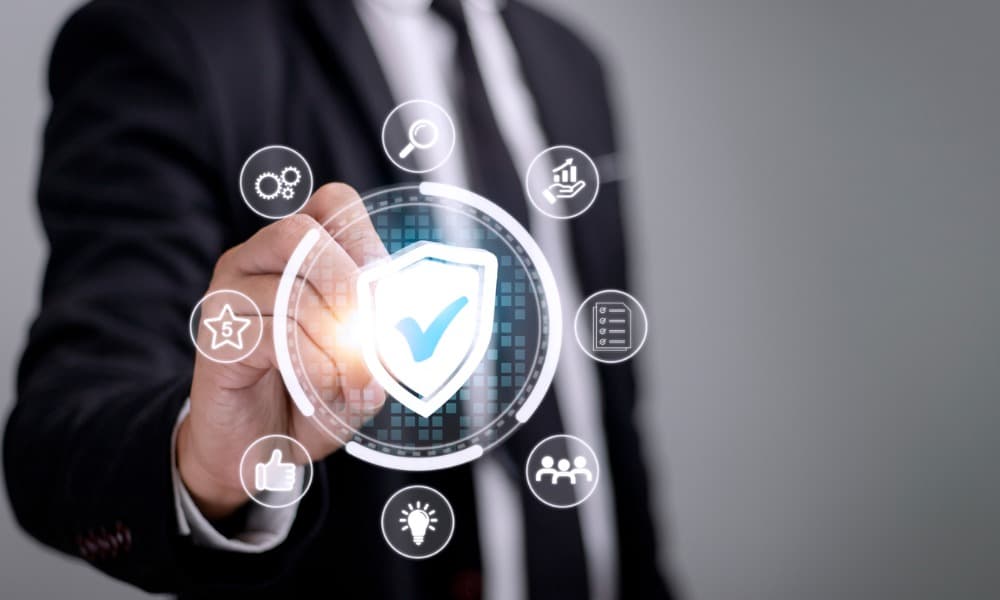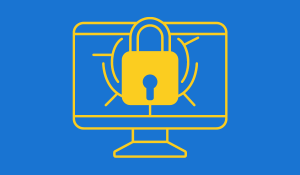Why should SMBs reallocate their cybersecurity spending to fight ransomware?
A strong cybersecurity strategy is essential for Small to Medium-Sized Businesses (SMBs). But why are so many SMBs ignoring cybersecurity when ransomware continues to rise?
Ransomware has SMBs reprioritizing their cybersecurity spending to combat attacks, keep businesses thriving, and reduce interruptions, delays, and unnecessary financial costs. Ransomware is a cyber-attack that plants malware into your system and stops you from accessing your business files, network, and devices until a ransom is paid.
Ransomware causes long and drawn-out business disruptions, financial costs, and the possible loss or breach of business data. This guide describes why ransomware attacks are a growing security threat for SMBs, tips to combat them, and the importance of investing in cybersecurity.
Key Takeaways:
- Why are Ransomware attacks a growing threat to SMBs?
- Why does combating ransomware attacks require a multi-layered cybersecurity approach?
- Why is investing in cybersecurity protection from ransomware attacks necessary for business security?
- How do we gain a competitive edge with cybersecurity best practices in today's digital business landscape?
Why is the cybersecurity landscape constantly changing?
Simply put – money. The cybersecurity landscape is ever evolving and becoming more complex. Even the old-fashioned phishing attacks find new approaches to steal data and turn a profit. Cyber threats like ransomware continue because they make money. Some attackers are driven by committing the perfect attack. Attacks aren’t always obvious either. Malware left undetected allows an attacker to dwell in your environments until they figure out what data has the most value, which they sell to the highest bidder.
Another reason is that businesses are still lax on cybersecurity. While larger organizations have invested significant funds in robust security and monitoring systems, many SMBs have not. Security is essential to any business's survival in the modern digital age.
Supporting and improving cybersecurity, including continuous monitoring, is critical. The problem with ransomware is that the more companies pay ransom to regain control of their business data, networks, and systems, and the more criminals are attracted in hopes of lucrative payouts.
What is the cost of ransomware attacks?
The cost of ransomware is expected to reach $265 billion by 2031. That massive number doesn’t help grasp the financial impact on an individual company. First, comes the financial impact of a ransom, or paying to manage or stop an attack after it has started. If your SMB doesn’t have several million dollars in liquid assets, plan to prioritize investing in robust cybersecurity, including continuous monitoring.
Don’t forget about the cost of long-term business disruption. Cyber-attacks may involve:
- Hiring third parties to manage the attack.
- Legal and public relations.
- Having employees and executives unable to work.
The lost revenue is at the beginning. Add regulatory fines for data security breaches per incident, and most SMBs are looking straight at financial ruin.
Why reprioritizing cybersecurity spending is necessary?
Reprioritizing cybersecurity into a budget is important to keep the business viable by strategically managing security. Now, reprioritizing budget allocations means something else gets their funds reduced. That’s simply a reality. What’s more important to the business than ensuring data and system security? Absolutely nothing because most SMBs won’t survive the costs of a ransomware attack.
One way to invest is to use a Managed Service Provider to help manage networks and security systems. MSPs provide cost-effective and quality security and system management services that fit any budget. Another option is outsourcing only system security and monitoring to an MSP or IT provider. Many IT providers specialize in security management and are up to date on the latest threats and how to control them. Additionally, MSPs or IT providers can assist in creating effective disaster recovery plans so your business can thwart ransomware and other attacks.
New product development, travel, and company events may all need to be trimmed for the sake of cybersecurity. Better to have a secure business than suffer the ramifications of an attack.
How to secure your networks and infrastructure?
Tips for preventing cyber-attacks include:
- Keep networks, devices, and software current and up to date.
- Use anti-virus and malware scanning solutions that continuously monitor.
- Back up data regularly and verify data backups are complete and secured.
- Create a rapid response and recovery plan that can be implemented quickly in the event of an attack
- Implement security across networks and devices.
- Use MFA (multi-factor authentication)
- Ensure all ports are secured, don’t leave any open TCP ports that can be accessed externally.
- Protect and secure all connected endpoints, APIs, and data in transit and at rest.
- Leverage the use of permissions to limit unnecessary access to system infrastructure.
- Employee education and training in cyber security needs to be ongoing and mandatory.
Consider if you’re currently using an external IT provider or MSP if they can better handle managing security for your organization at a lower cost. Security practices are ongoing, and they don’t get less expensive. Maintaining a department of top-of-the-line security experts is not feasible, even if it is affordable for your business. Most MSPs can help manage networks, including robust security practices.
What’s involved in backup, recovery, and incident response?
The purpose of having a backup, recovery, and incident response plan is to provide an approach to managing a security incident quickly. Chaos reigns when an attack occurs - a solid backup, recovery, and incident response can help manage an attack effectively.
Create a core team and prepare them in case of an attack. Security incidents are more effectively managed when organizations are not trying to figure it out in a hurry.
Core team members must be trained on the following:
- Decision rights
- It must be clear who is making decisions on the response.
- Response preparation and known constraints
- Procedures for managing board members, stakeholders, employees, and customers during and after an attack
- Procedures for managing business continuity.
- Making sure the business continues to operate.
- Know and document what assets are critical.
- Document the backup process.
- Test your disaster recovery response plan to ensure it works.
- Testing will inform how long it’ll take to get the business back to normal.
- Determine who will contact the FBI and insurance providers.
- Designate a team member to work with the US Department of the Treasury if you pay a ransom.
- Ransom payments may violate sanctions and make the business liable for financial crimes.
- Verify the attack is authentic and that business data is at risk.
- Remember a criminal may not release your data even after you pay.
- Have a set of team members create alternatives to paying a ransom. If your data backup and recovery plan is robust, you may simply rebuild and re-secure the system from scratch.
How effective is cybersecurity monitoring?
Preventing cyber-attacks means an organization must understand what technology is used and how. Once the infrastructure is known, then it must be watched continuously and vigilantly. The only way to fend off and prevent attacks is by continuously monitoring all systems, including connections, databases, and business partners.
Continuous monitoring effectively thwarts attacks and is the only way to track system integrity. Security is no longer a do it once, and you’re done operation. Security is continuous, from monitoring systems processes to training employees on secure practices. Security must be ingrained into the company’s DNA.
Need a trustworthy cybersecurity solution?
SMBs are at high risk for ransomware and other cyber-attacks. To best protect a business, prioritize spending to ensure a robust security strategy is in place. If your organization isn’t ready to manage security independently, consider a trustworthy MSP partner with extensive security expertise.
Let Endsight assess your system and create a workable and budget-friendly IT support strategy for the long run. Build a true MSP business partnership with Endsight. Providing quality IT-managed services requires an effective business partnership with clear communication and trust.
Endsight has a strong, successful following. Read more to find out why our customers chose us and why they stay. You’ll never have to worry about communication failures, inaccurate information, or ineffective security. Get your free assessment today and see how Endsight can help.
Looking for a high-quality and security-aware MSP? Check into Endsight. Find out how Endsight can help you build your business through a strong, supportive, and equitable business partnership.



/jclause.jpg)
